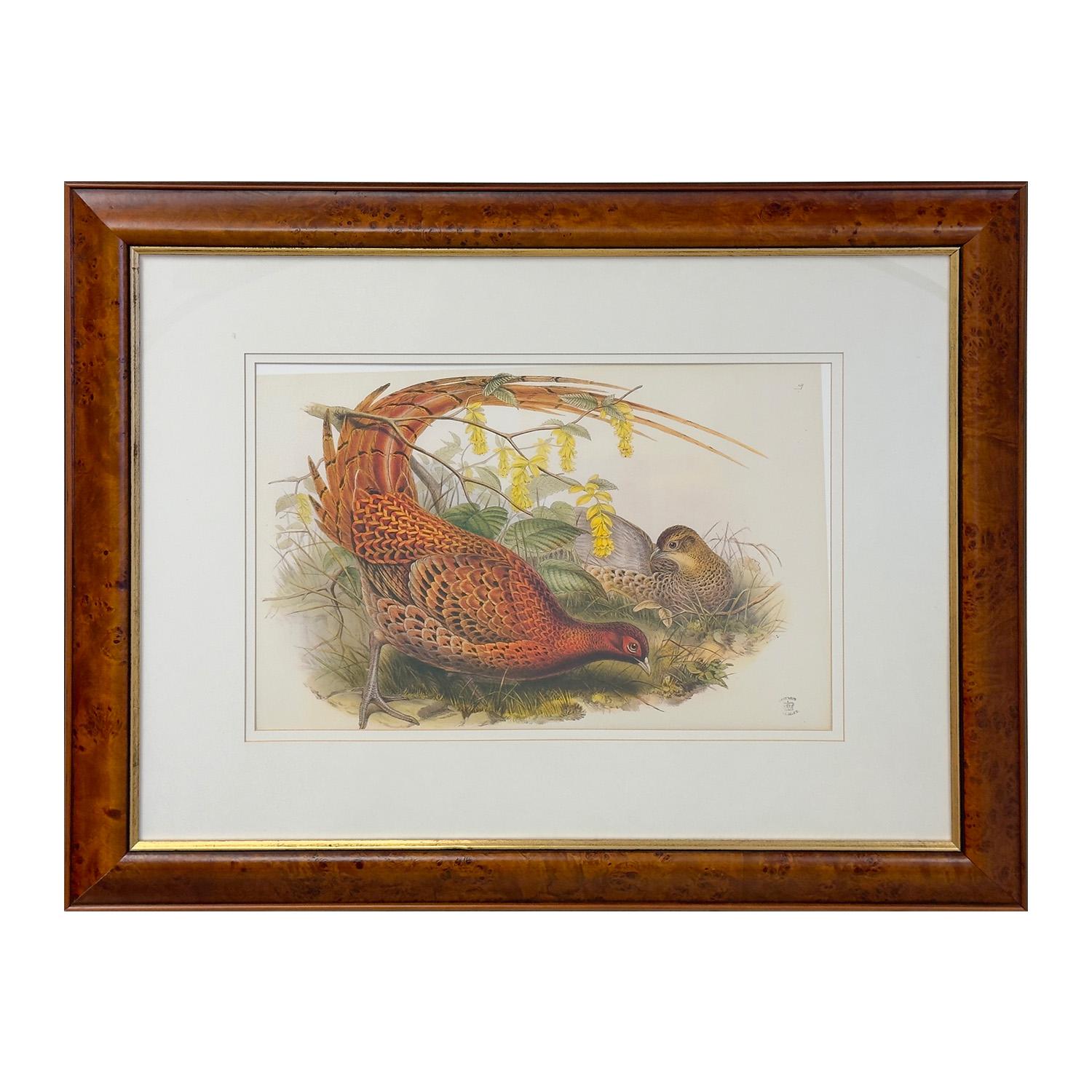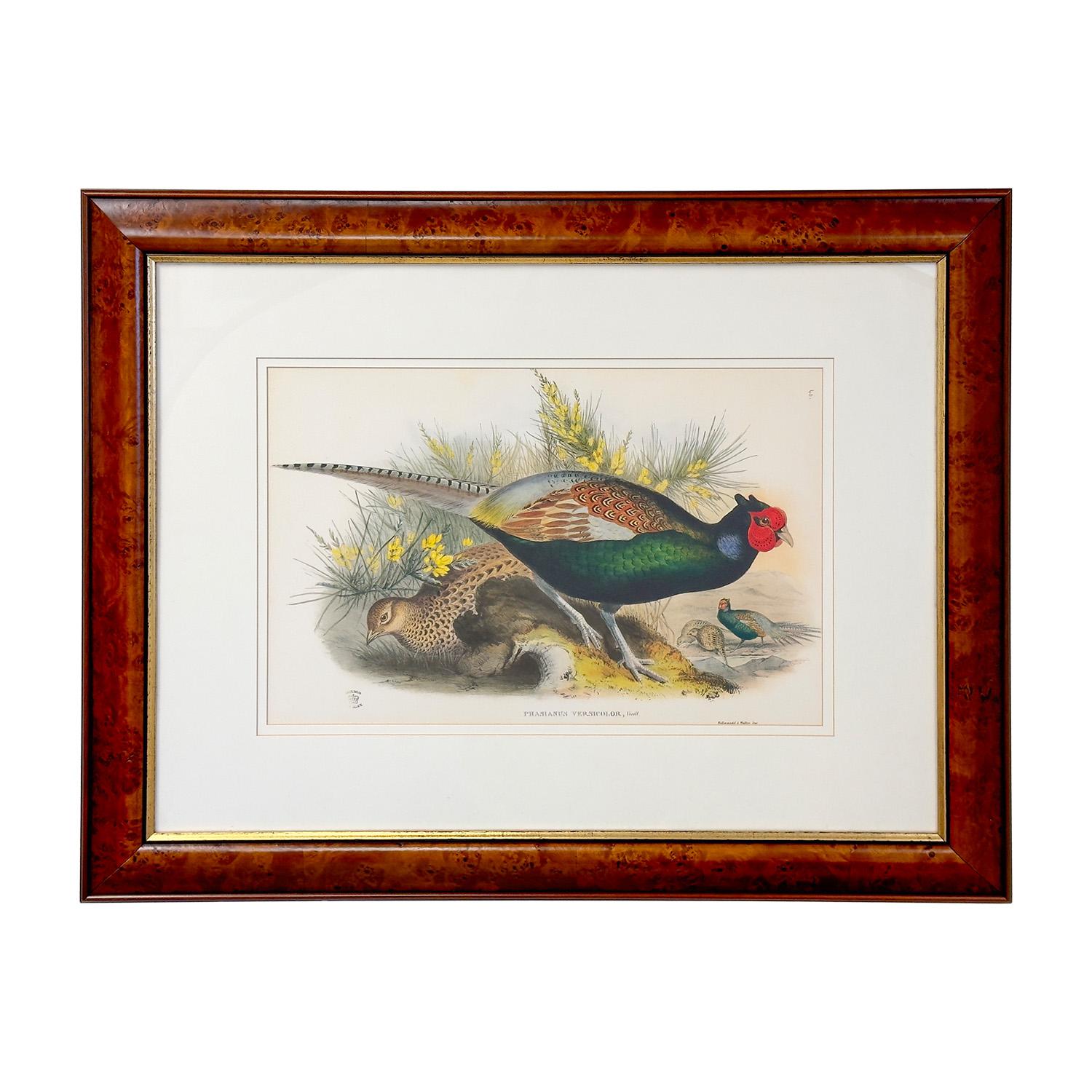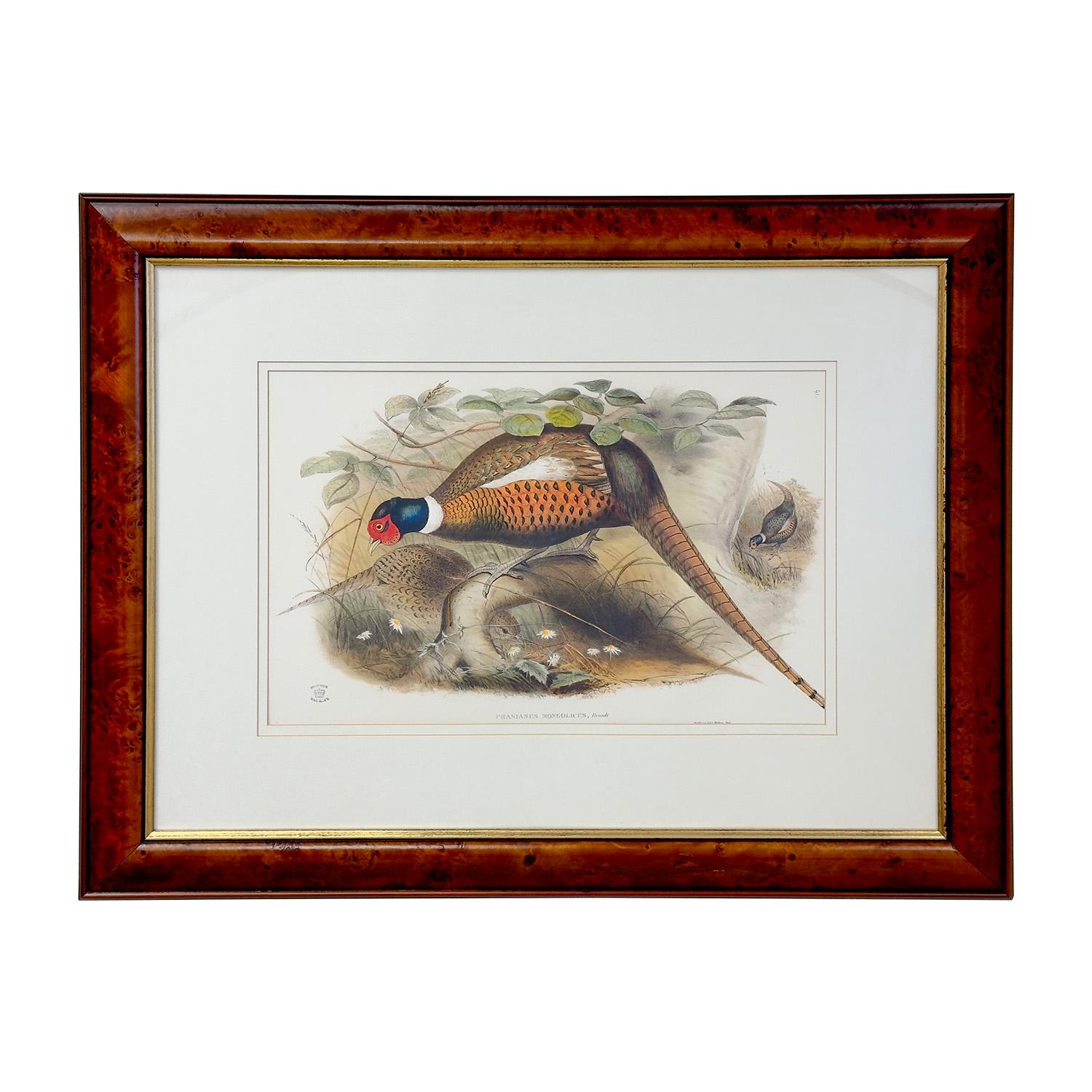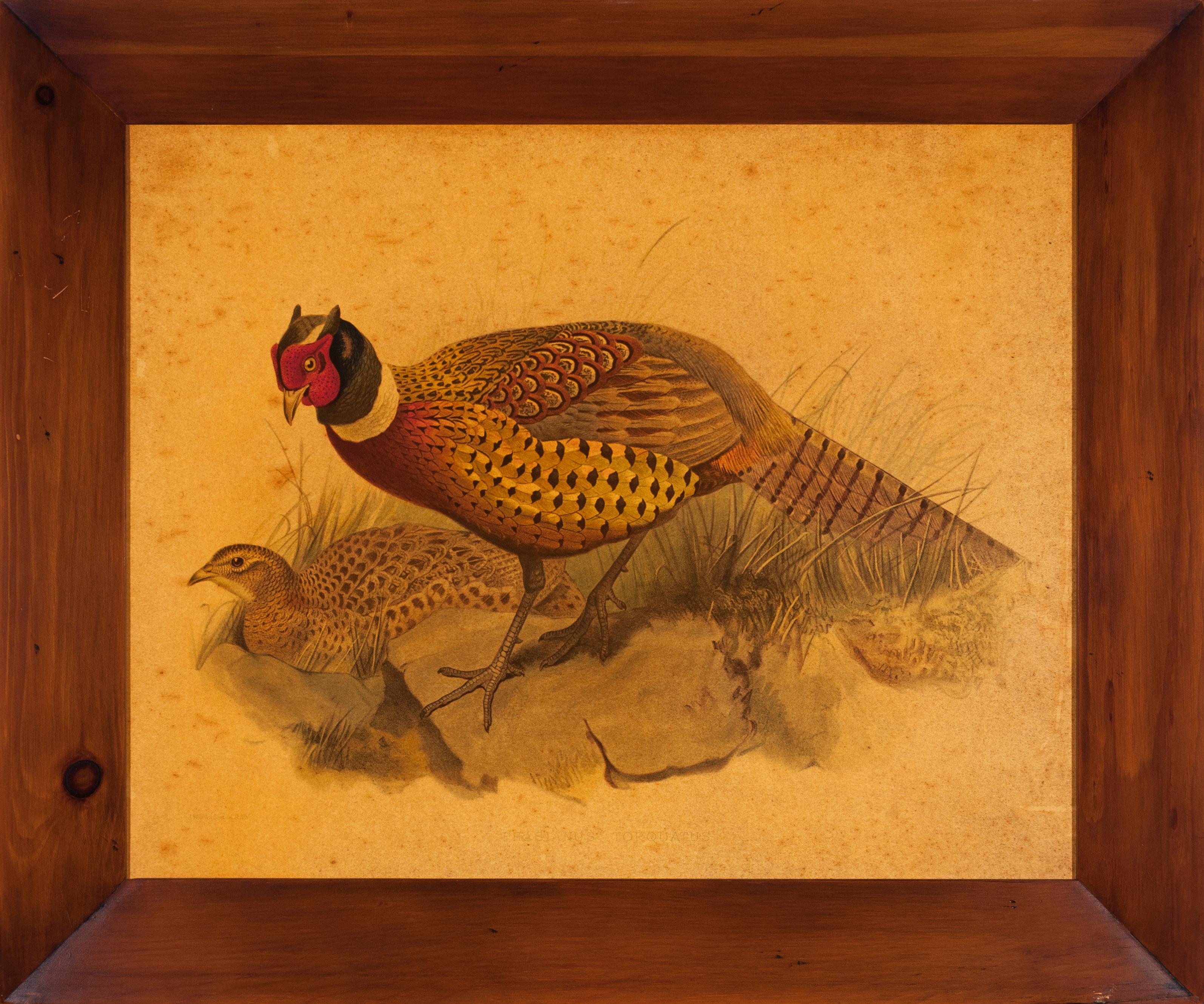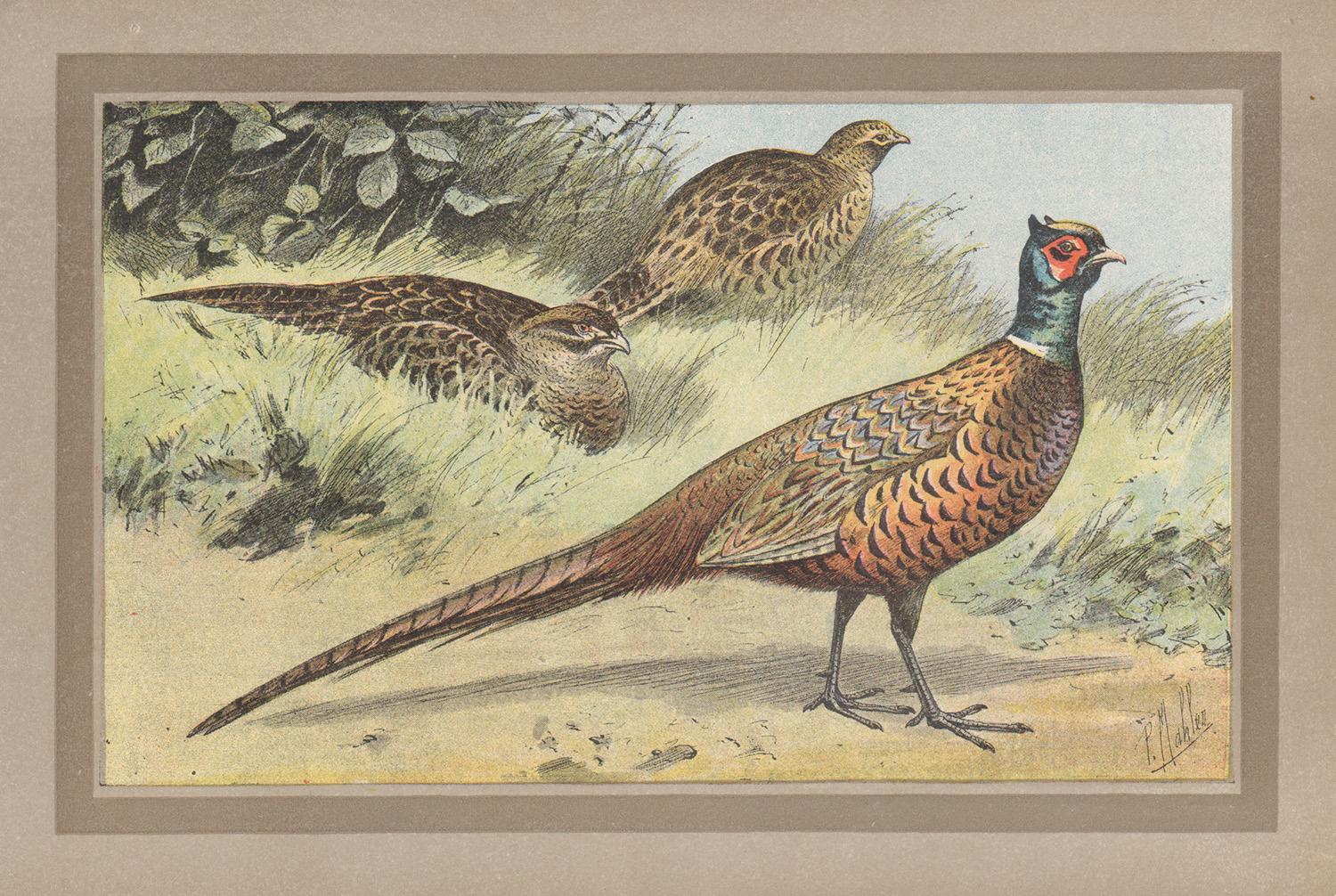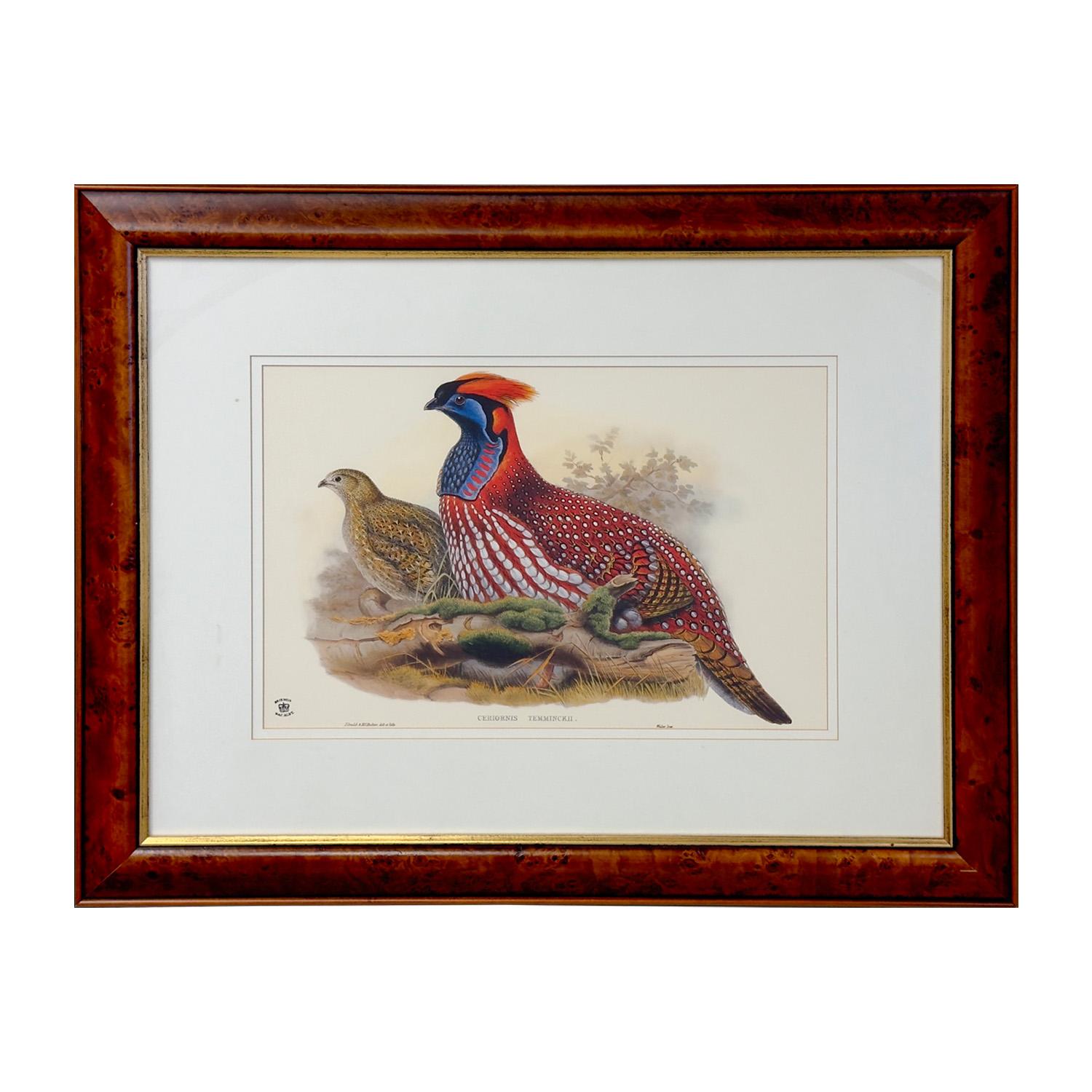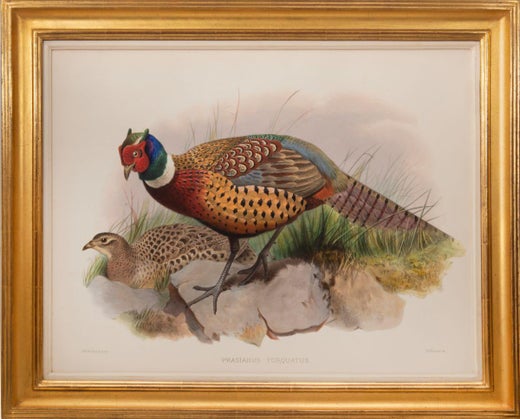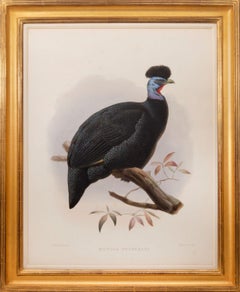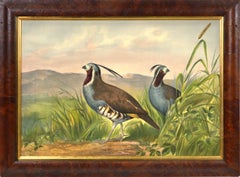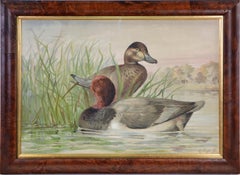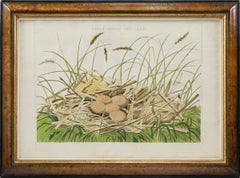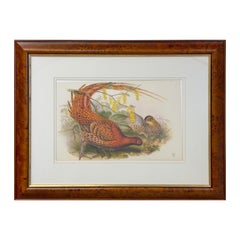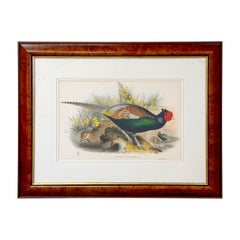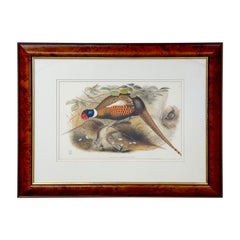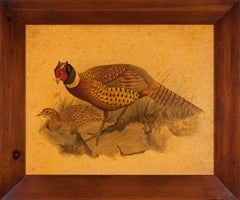Items Similar to Four Pheasants
Want more images or videos?
Request additional images or videos from the seller
1 of 8
Joseph WolfFour Pheasants1871
1871
$17,232.64
£12,500
€14,596.82
CA$23,827.19
A$26,159.29
CHF 13,647.36
MX$316,563.78
NOK 171,048.42
SEK 161,172.58
DKK 108,961.38
About the Item
WOLF, Joseph (artist)
Four Pheasants
London, For the author, Red Lion Court, Fleet Street, 1871
Four original hand-coloured lithographic plates by Joseph Smit after Joseph Wolf.
A group of four beautiful lithographs of pheasants taken from the Monograph of the Phasianidae or Family of the Pheasants, by Daniel Giroud Elliot. Elliot, born in New York in 1835, was active in London for 10 years from 1869 publishing his monographs on pheasants and birds of paradise. He was a founder of the American Ornithologists’ Union. His luxurious books are notable for using the finest bird artists and lithographers of the time.
Framed and glazed, overall size: 72cm by 58.5cm by 4.5cm.
- Creator:Joseph Wolf (1820 - 1899, German)
- Creation Year:1871
- Dimensions:Height: 23.04 in (58.5 cm)Width: 28.35 in (72 cm)Depth: 1.78 in (4.5 cm)
- Medium:
- Movement & Style:
- Period:
- Condition:Framed and glazed with glass.
- Gallery Location:London, GB
- Reference Number:Seller: 1085871stDibs: LU1419212221792
Joseph Wolf
Joseph Wolf was the most prominent ornithological artist to contribute illustrations to John Gould’s bird books. While growing up on a farm in Germany, Wolf roamed the countryside and developed a strong interest in observing and sketching the wildlife. In 1836 his father reluctantly permitted him to become an apprentice at a lithographic firm in nearby Coblenz (Jackson 1975, 63). After spending three years there improving his drawing skills and learning how to copy drawings onto the limestone blocks used for lithographic printing, Wolf returned to the family farm, but only for a year. Scientific contacts led him first to Darmstadt and then to Leiden in the Netherlands, where he progressed from illustrating ornithological books to become a painter of birds and animals. He improved his artistic skills still more by attending art school.
He developed the idea of depicting birds in motion, such as the dramatic scene of a Capercaillie escaping a fox that he drew for the publisher, Kern, in 1846 (Jackson 1975, 64). When revolution disrupted life on the European continent in 1848, Wolf took up the invitation of David William Mitchell, secretary of the Zoological Society of London, and assisted Mitchell in illustrating George Robert Gray’s book, Genera of Birds (1844-1849). In 1849 Wolf also began to provide John Gould with illustrations for The Birds of Great Britain (1862-1873), his approach being especially suitable for birds of prey (Jackson 1975, 67). For example, he shows the Hooded Crow stealing an egg from a nest (Figs. 2 and 3). Rather than commit to working full-time for Gould, Wolf retained his independence as a free-lance artist. Wolf’s biographer, Samuel Palmer, recounted that Gould enticed Wolf to visit and make charcoal drawings of birds for him by setting out Wolf’s favorite cigars and drawing materials. Whether that story is true or not, it is also recorded that Wolf objected to the overly bright tints chosen by Gould for coloring the lithographic prints (Jackson 1975, 67).
The drawings made by Wolf for The Birds of Asia (1850-1883) were his last for Gould Gould’s text about Bulwer’s Pheasant thanks the British Museum for loaning him the unique type specimen, “which has enabled me to prepare the accompanying Plate from the talented pencil of Mr. Wolf’ (Figs. 4 and 5). Wolf’s drawings were rendered on stone by Henry Constantine Richter, another Gould artist who had earlier worked on illustrations for Gray’s Genera of Birds. It must have been an oversight that Wolf’who had drawn the Painted Spurfowl for Gould, was not credited on the published plate. Source:
Website of University of Kansas Libraries: Gould History and Background
About the Seller
5.0
Vetted Professional Seller
Every seller passes strict standards for authenticity and reliability
Established in 1979
1stDibs seller since 2020
19 sales on 1stDibs
- ShippingRetrieving quote...Shipping from: London, United Kingdom
- Return Policy
Authenticity Guarantee
In the unlikely event there’s an issue with an item’s authenticity, contact us within 1 year for a full refund. DetailsMoney-Back Guarantee
If your item is not as described, is damaged in transit, or does not arrive, contact us within 7 days for a full refund. Details24-Hour Cancellation
You have a 24-hour grace period in which to reconsider your purchase, with no questions asked.Vetted Professional Sellers
Our world-class sellers must adhere to strict standards for service and quality, maintaining the integrity of our listings.Price-Match Guarantee
If you find that a seller listed the same item for a lower price elsewhere, we’ll match it.Trusted Global Delivery
Our best-in-class carrier network provides specialized shipping options worldwide, including custom delivery.More From This Seller
View AllTwo Guinea Fowl
By Joseph Wolf
Located in London, GB
WOLF, Joseph (artist).
Two Guinea Fowl
London For the author, Red Lion Court, Fleet Street 1871
Two original hand-coloured lithographic plates by Joseph Smit after Joseph Wolf. ...
Category
1870s Animal Prints
Materials
Paper, Watercolor, Gouache, Lithograph
Chromolithograph of Quail
By Alexander Pope Jr.
Located in London, GB
Chromolithograph of Ducks, laid on to contemporary card (as published).
[Charles Scribner's Sons, New York, 1878].
Alexander Pope, Jr., was an American sculptor and painter. He’s kn...
Category
1870s Naturalistic Animal Prints
Materials
Handmade Paper, Lithograph
Group of Six Water Fowl
By Alexander Pope Jr.
Located in London, GB
POPE Jr., Alexander
Group of Six Water Fowl.
Group of Six chromolithographs of game-birds, each laid on to contemporary card (as published).
[Charles Scribner's Sons, New York, 1878].
Alexander Pope...
Category
1870s Naturalistic Animal Prints
Materials
Lithograph
A Group of Four engraved and hand-coloured Birds Nests.
By Cornelis Nozeman and Jan Christiaan Sepp
Located in London, GB
NOZEMAN, Cornelius and Jan Christian SEPP.
A Group of Four Birds Nests: NIDUS ARDEAE, Nycticoracis; NIDUS PLATALEA, Leucorodia; NIDUS ARDEAE STELLARIS and NIDUS PELECANI, Carbonis f...
Category
1770s Naturalistic Animal Prints
Materials
Watercolor, Engraving
PRÉVOST. Print from Collection des Fleurs et des Fruits
By Jean Louis Prévost
Located in London, GB
Original stipple engraving by Charles-Louis Ruotte, printed in colour and finished by hand. Framed and glazed, overall size: 63.3 by 47.2 cm.
[Paris 1805].
Prevost came from a lo...
Category
Early 1800s Naturalistic Still-life Prints
Materials
Color, Engraving, Handmade Paper
HERBST. A Group of Four Crustaceans
By Johann Friedrich Wilhelm Herbst
Located in London, GB
A Group of four hand-coloured engraved plates of Crabs by Schellenburg, P. Haas, Heidenreich and Ludwig Schmidt.
Framed and glazed, overall size: 36.4 x 53.8 cm.
Johann Friedric...
Category
Early 1800s Naturalistic Animal Prints
Materials
Engraving, Handmade Paper
You May Also Like
John Gould Pheasants "Phasianus Soemmeringii " Large Lithograph, Framed
By John Gould
Located in Plainview, NY
A large print of John Gould of Pheasant ""Phasianus Soemmeringii " from his published book " Birds of Australia ". John Gould was influenced by James Audubon paintings of birds work ...
Category
20th Century Naturalistic Animal Paintings
Materials
Lithograph
John Gould Japanese Pheasant "Phasianus Versicolo" Large Lithograph, Framed
By John Gould
Located in Plainview, NY
A large print of John Gould of Japanese Pheasant ""Phasianus Versicolo " from his published book " Birds of Asia". John Gould was influenced by James...
Category
20th Century Animal Prints
Materials
Paper
John Gould & Henry Constantine Richter Birds of England Pheasant Print
By John Gould and Henry Constantine Richter
Located in Plainview, NY
A large print of John Gould & Henry Constantine Richter Pheasants II from his published book " Birds of Australia ". John Gould was influenced by James Audubon paintings of birds w...
Category
20th Century Naturalistic Animal Paintings
Materials
Paper
Phasianus colchicus
By Joseph Wolf
Located in Columbia, MO
Joseph Wolf
Lithograph
c.1940
Category
Mid-20th Century Naturalistic Animal Prints
Materials
Lithograph
Pheasant, French antique natural history bird art illustration print
Located in Melbourne, Victoria
French chromolithograph, published in 1931. Printed title lower right of sheet. Plate number top right. From a French series of illustrations of birds.
195mm by 265mm (sheet)
Category
1930s Art Deco Animal Prints
Materials
Lithograph
John Gould & Henry Constantine Richter Birds of Asia Temminck's Tragopan Print
By John Gould and Henry Constantine Richter
Located in Plainview, NY
A large print of John Gould & Henry Constantine Richter of Temminck's Tragopan from his published book " Birds of Asia ". John Gould was influenced by James Audubon paintings of bi...
Category
20th Century Naturalistic Animal Prints
Materials
Handmade Paper
